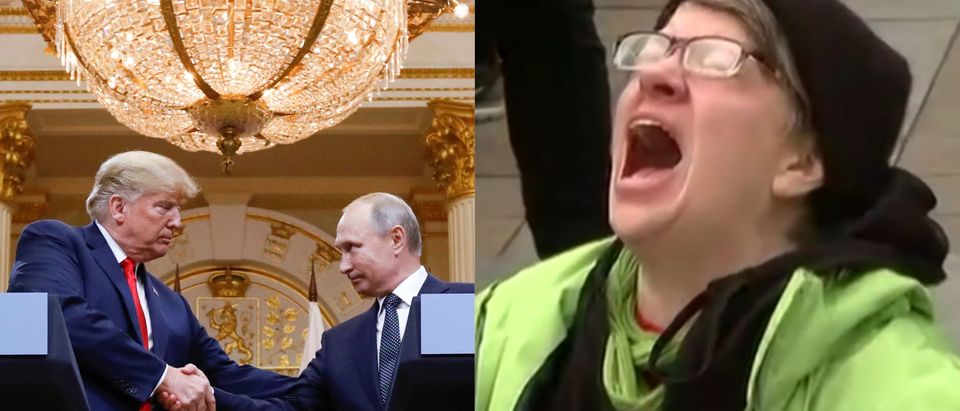Perception is reality. So when President Trump hosted a press conference in Helsinki with Russian President Vladimir Putin and said that he has “confidence in both parties” — between U.S. intelligence agencies’ accusation that Russia meddled in the 2016 US elections versus Vladimir Putin’s denial of these accusations — politicians and media began spinning the perception that the U.S. president is a traitor.
Some went as far as to compare the press conference to the Watergate scandal, Pearl Harbor and the 9/11 terrorist attacks.
Even the worst press conference is not Pearl Harbor or 9/11. The fact that media commenters could say this about a press conference with a straight face — let alone publish it — reveals their inflated self-regard and discredits their judgment.
Politicians spouting similar nonsense — such as Rep. Steve Cohen, who said the president “is in the hands of our enemy” — are, sadly, the people who manage our government. Take this as another warning against trusting their judgment.
The reality is that Trump’s actual policies toward Russia are more adversarial than his rhetoric was. That reality should inform public opinion more than the rhetoric does. Nonetheless, even if people want to form their opinions based on the president’s rhetoric, let them at least consider more rhetoric than just one day’s press conference.
In Europe last summer, Trump spoke at the monument to the Warsaw Uprising of 1944. During the uprising, Polish partisans — an actual #Resistance — had summoned Russian assistance and rebelled against Nazi occupation. But “Soviet armed forces stopped and waited. They watched as the Nazis ruthlessly destroyed the city, viciously murdering men, women, and children.”
Trump criticized the ensuing Soviet occupation of Poland and the imposition of communism.
Relating that history to current events, Trump said, “We urge Russia to cease its destabilizing activities in Ukraine and elsewhere, and its support for hostile regimes — including Syria and Iran — and to instead join the community of responsible nations in our fight against common enemies and in defense of civilization itself.”
Visiting Europe again last week, the president reiterated this message. He said Russia was a “competitor” to the United States and Europe. He reminded journalists that the purpose of NATO is to counter the security threat from Russia. He called on NATO members to increase their financial commitments to European security, which are disproportionately paid by the United States. And — most importantly — Trump chided Russian infiltration into European society and government.
Specifically, the president called out Europe’s overreliance on Russian energy exports and on its officials’ coziness with the Russian government: the most recent German Chancellor, Gerhard Schröder, now works for Russian government-owned energy companies.
Yet, American media and politicians didn’t praise the president for criticizing Russia or spurring NATO to counter it. To the contrary, they accused Trump of being more loyal to Vladimir Putin than to NATO.
Such criticism assumes that flattering allies is more important than achieving strategic objectives, like the tens of billions of dollars raised for NATO at Trump’s urging. And it shows that no matter whether the president expresses alarm about Russia or else expresses faith in Russia, either way, he’ll be called a Manchurian candidate.
After a news cycle of histrionics from both Republicans and Democrats, the president retracted his words from the press conference. But Trump has nothing to apologize for, whether in word or deed.
His administration has confronted Russia on many fronts. Most notably, Trump has been equipping Ukraine and Georgia — two countries under Russian occupation — with weapons systems for fighting Russian forces off their land. Mikheil Saakashvili, who served as Georgia’s president during the Russian invasion of 2008, explains this in detail.
Trump was also accused of diminishing U.S. intelligence agencies. His press-conference retraction, accordingly, focused on elevating them. He said, “I have full faith and support for America’s great intelligence agencies. Always have.”
But even during the president’s initial press conference, he had expressed “great confidence in my intelligence people” while criticizing the “disgrace” caused by Peter Strzok, the former chief of counterespionage at the FBI, and other intelligence officials. Unintentionally proving Trump’s point, the former Directors of the CIA and the FBI abandoned any pretense of objectivity in their reactions to the president’s press conference, respectively calling for Republicans to impeach Trump and for “all who believe in this country’s values” to vote Democratic.
This week’s hysterical media reaction to the president’s press conference with Vladimir Putin shows that watching the news is a Catch-22. News consumers want to learn about their government. But watching the news presents them with worse information than ignoring it does.
Lew Jan Olowski is a married father of two and an attorney in Maryland.
The views and opinions expressed in this commentary are those of the author and do not reflect the official position of The Daily Caller.


